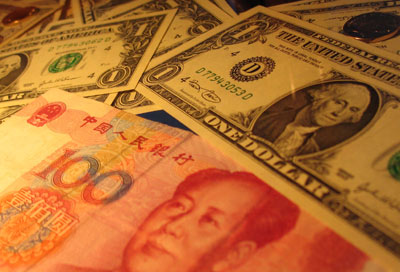Yuan gains vs greenback after US interest rate cut
Updated: 2007-11-01 13:05
China's currency rose to a new record against the greenback on Thursday after the US Federal Reserve cut the key interest rate the previous day.
|
|
Before Thursday's trading started, the People's Bank of China (PBOC) set the yuan central parity rate at 7.4552 relative to the US dollar. The new midpoint marked an appreciation of 0.6 percent in the past seven trading days and a 4.6 percent rise since the beginning of the year.
The hefty rise of 140 basis points over the previous session came after the Fed slashed the federal funds rate, an overnight lending rate between banks, by 25 basis points on Wednesday to prevent a slowdown in the economy.
"The rate cut further reduces the appeal of dollars and will facilitate the capital flow to emerging markets, including China," Professor Guo Tianyong of the Central University of Finance and Economics (CUFE) told chinadaily.com.cn Thursday morning.
The weakening dollar makes China's yuan and other world major currencies face rising pressure for appreciation.
However, China's exchange rate formation system is still a managed floating one, Guo said, adding that the central bank has to take various factors into consideration when deciding whether to allow a faster appreciation in the coming days.
In addition to the exchange rate pressure, China faces other fallouts from the Fed move. Before Wednesday, there was wild speculation in China that the PBOC was mulling a sixth interest rate hike this year to keep the world's fastest growing major economy from overheating.
The country's gross domestic product grew 11.5 percent year-on-year in the third quarter, while inflation jumped 6.2 percent in September, the National Bureau of Statistics said last week.
However, "the Fed move increases the difficulty for the central bank [to raise interest rates]," said Professor Song Guoqing of Peking University. Song anticipates another rate increase this year.
Guo of CUFE shared Song's view, saying the pressure on the central bank is growing.
But Guo deemed that the central bank has the room to raise rates, as there is still a difference between benchmark interest rates in China and the United States.
The current one-year deposit rate in China stands at 3.87 percent while the US federal funds rate is 4.50 percent after Wednesday's cut.
Moreover, the interest spread is not the major concern for the central bank, Guo said, adding that the domestic inflationary level and asset prices are more important factors to decide policy changes.
The US rate cut also gave rise to mounting worries in China about increasing liquidity, which has pushed up housing and equity prices in the country.
Guo downplayed those concerns, saying the interest spread is not the major target of outside capital. "Whether the liquidity will increase depends mainly on the expectation of rising prices in the housing and equity market, and the renminbi appreciation."
Zuo Xiaolei, chief economist of Galaxy Securities pointed to the pressure of increasing liquidity as capital inflow might increase, and is urging the PBOC to tighten the curb on potential hot money influx.
The Fed should have been more cautious when deciding on the rate cut, said the female economist, citing inflation and red-hot crude oil prices in the global market.
"It [the Fed] should not just consider Wall Street," Zuo said. "All factors should be taken into account."
In an online vote on the Wall Street Journal website, by 14:29 Thursday (Beijing Time) only 33 percent of those surveyed thought the Fed had made the right move, while 49 percent believed the rate should be left unchanged.
|
|
